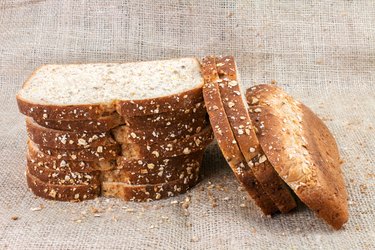
Whole wheat bread is usually considered healthy. However, there tend to be a lot of carbs in wheat bread and most other baked goods. If you're following a low-carb diet, it's best to avoid or limit bread and other grain-based foods.
Tip
Consuming wheat bread on a keto diet isn't usually recommended. But you can eat bread that's made using low-carb food products, like coconut flour or almond flour.
Video of the Day
Video of the Day
Low-Carb Diets and Carbohydrates
Low-carb diets restrict carbohydrate intake and ask you to consume more fat instead. According to the Mayo Clinic, most low-carb diets call for a carbohydrate intake between 20 and 60 grams per day.
Low-carb diets specifically want you to limit net carbs. According to a July 2017 study in the journal Consultant Pharmacist, net carbs are all carbohydrates, minus sugar alcohols and dietary fiber. This means that low-carb foods rich in starches and sugars are off-limits — but dieters can still eat as much fiber as they want.
If you've just started following a low-carb diet, you may not be aware of the variety of food products you need to avoid. Many common foods like bread, cookies, fried chicken and dumplings aren't low-carb-diet friendly.
In general, you should not eat foods that are made with refined grains. However, many whole grains and even certain fruits and vegetables may need to be restricted too.
This means low-carb dieters should avoid most baked goods, which range from bread to pastries. Low-carb dieters also need to limit their intake of starchy foods like potatoes and grain-based products like rice and barley. Fried foods with flour-based coatings and thickened sauces, like gravy, are also off-limits.
Read more: 16 Diet-Friendly Healthful Carbs
Carbs in Wheat Bread
According to the USDA, whole wheat bread's calories (for two slices, or 64 grams) total 161. A serving of two slices also has 27.3 grams of carbohydrates (3.8 grams come from fiber), 8 grams of protein and 2.2 grams of fat (0.5 grams come from saturated fat). Whole wheat bread is rich in a variety of essential nutrients — particularly manganese, selenium and B-complex vitamins.
If you were following a standard Western diet, whole wheat bread would be considered very healthy. However, according to the Mayo Clinic, in Western diets most of your daily calories (45 to 65 percent) come from carbohydrates.
Unfortunately, whole wheat bread's carbohydrate numbers are too high to be appropriate for many low-carb diets. A two-slice serving of whole wheat bread has 23.5 net carbs.
Choosing Healthy Carbohydrates While Dieting
If you're following a strict low-carb diet, such as a ketogenic diet (consuming 20 net carbs or less), eating just two slices of whole wheat bread would exceed your total carbohydrate intake for the day. This means you should avoid consuming wheat bread on a keto diet.
If you're following a less strict low-carb diet (40 to 60 net carbs per day), eating two slices of bread a day could be part of a healthy diet. However, whether or not this is healthy would depend entirely on the other carbohydrates you're planning to eat that day.
If you choose to eat whole wheat bread on a low-carb diet, you'll need to avoid other carbohydrate-rich foods on the same day. You'll specifically need to stay away from fruits, grains and starchy foods like potatoes, yams and parsnips.
This is because certain nutrients, like dietary fiber, are important to keep track of too. According to the Food and Drug Administration, most people need to consume about 25 grams of dietary fiber each day.
Although foods like wheat bread and other grain products are healthy, they're not rich enough in fiber to make up the majority of your diet's carbs. If you want to consume a healthy low-carb diet and get enough fiber, make sure you get your daily recommended amount of dietary fiber from leafy greens and other low-carb vegetables on the days that you eat wheat bread.
Craving bread is perfectly understandable. If you're trying to follow a low-carb diet but need to avoid carbohydrate-rich foods, try eating bread made with low-carb flours. Coconut flour, certain nut flours and even flaxseed flour can be used to make a variety of low-carb foods.